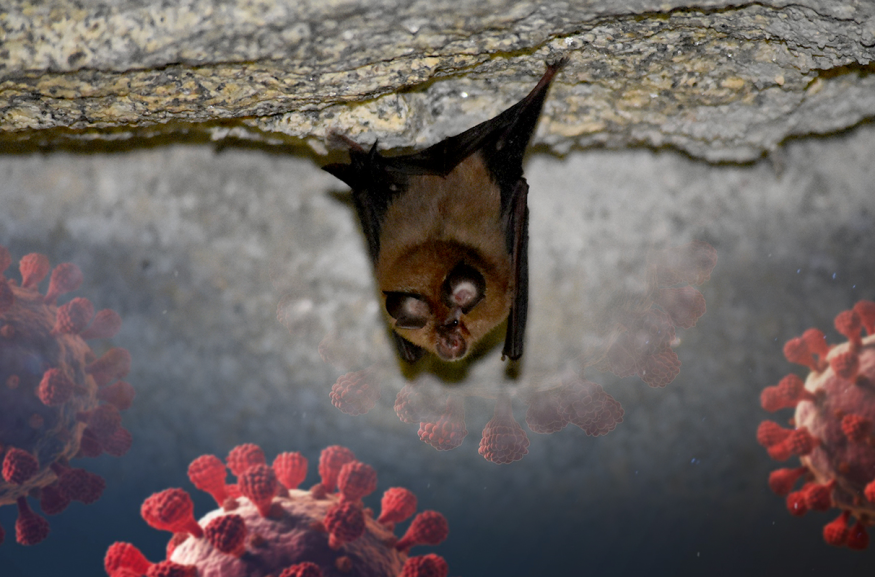A virus discovered in a Russian bat that is related to SARS-CoV-2, the virus that caused COVID-19, has the potential to infect humans and is likely resistant to existing vaccines. Researchers at Washington State University's Paul G. Allen School for Global Health found that spike proteins from the bat virus, called Khosta-2, can infect human cells and are resistant to both monoclonal antibodies and serum from people who have received the SARS-CoV-2 vaccine. Both Khosta-2 and SARS-CoV-2 are coronaviruses from the sarbecovirus subclass.
According to Michael Letko, a WSU virologist and the corresponding author of the published study in PLOS Pathogens, sarbecoviruses in wildlife outside of Asia, like the Khosta-2 virus found in western Russia, pose a threat to global health, and ongoing efforts to create vaccines for SARS-CoV-2. Letko emphasizes the need for universal vaccinations against sarbecoviruses in general, rather than just against known versions of SARS-CoV-2.
Currently, groups are working to create vaccines that protect against sarbecoviruses in general, rather than just against specific known versions of SARS-2, added by Letko. However, many current vaccines are designed to protect against only the specific viruses known to infect human cells or those that pose the biggest risk to humans. To better protect against all sarbecoviruses, the design of these vaccines needs to be broadened.
Infecting Human Cells
Despite the identification of hundreds of sarbecoviruses, mostly in Asian bats, the majority cannot infect human cells. In late 2020, Khosta-1 and Khosta-2 were found in Russian bats; but at first, they didn't seem dangerous to people. However, further studies showed that they can infect human cells, changing our understanding of these viruses and where they come from.
Letko worked with two WSU faculty members, Stephanie Seifert and Bonnie Gunn, to study the newly discovered viruses. They found that Khosta-1 posed a low risk to humans, but Khosta-2 had some concerning traits. Like SARS-CoV-2, Khosta-2 can use its spike protein to infect human cells by attaching to the ACE2 receptor protein found throughout human cells. They tested current vaccines against the new virus and found that they were not effective against Khosta-2.
The virus is also lacking some genes involved in pathogenesis in humans, but there is still a risk of it recombining with a second virus-like SARS-CoV-2. This scenario could lead to the creation of a potentially more dangerous virus, following the university press release.

ALSO READ : COVID-19 Infections Are Rising in England Amid Booster Vaccine Crisis as Elderly Refuses Vital Vaccination
Affecting Vaccinated Individuals
Letko, along with viral ecologist Stephanie Seifert and viral immunologist Bonnie Gunn, studied the two newly discovered viruses. They found that Khosta-1 posed a low risk to humans, but Khosta-2 had some troubling traits. Like SARS-CoV-2, Khosta-2 can use its spike protein to infect cells by attaching to the ACE2 receptor protein found in human cells. The team then tested whether current vaccines can protect against Khosta-2. Using serum from people who have been vaccinated for COVID-19, the team found that Khosta-2 was not neutralized by current vaccines.
They also tested serum from people infected with the omicron variant, but the antibodies were ineffective against Khosta-2. Fortunately, Letko said that Khosta-2 lacks some of the genes involved in pathogenesis in humans. However, there is a risk that Khosta-2 could combine with another virus like SARS-CoV-2 to create a potentially riskier virus.
According to Business Standard, Khosta-1 does not easily infect human cells. However, the antibodies in serum from people who were vaccinated for COVID-19 were not able to neutralize Khosta-2. The same result happened when Khosta-2 was combined with serum from people who recently recovered from Omicron infection. Researchers emphasized that their intention is not to scare people, but to inform them that sarbecoviruses in wildlife outside of Asia can also pose a threat to global health. Therefore, more protective vaccines are needed to prevent outbreaks of zoonotic coronaviruses.
RELATED ARTICLE : Novel Vaccine-Resistant Virus Found in Russian Bats Could Infect Humans
Check out more news and information on COVID-19 on Science Times.
© 2025 ScienceTimes.com All rights reserved. Do not reproduce without permission. The window to the world of Science Times.












